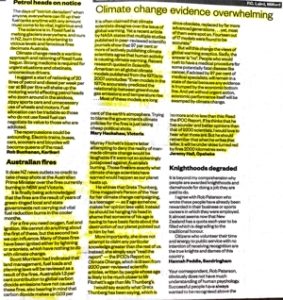A brain-dead editorial, a fresh view of CO2, an amazing letter, the kitten and the blue whale.
An editorial in Tuesday’s Herald ($) begins:

Amazing that he somehow knows what is discussed not only in “most households” but in “other social gatherings,” though it sounds to me like projection. The editorial goes on to conflate our discoloured sky, the scale of the bush fire outbreaks and the heat at the Melbourne cricket as reasons we ought not doubt we’re causing dangerous warming. It says we not only saw but felt the heat of the bush fires in New Zealand (which, 1200 km away, pushes the barrow a mite far). Preposterously, it ends: “The sun was so sizzling it became a wonder anything combustible was not catching fire.” But maybe Auntie Herald was trying to crack a funny. Continue Reading →
Views: 39



